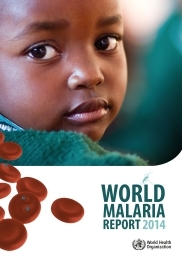Malaria on the decline
Malaria is killing fewer people with the number people dying from the mosquito-borne parasitic infection falling dramatically since 2000, according to the World Malaria Report 2014.

Malaria cases are also on a steady decline. Between 2000 and 2013, the malaria mortality rate decreased by 47% worldwide and by 54% in sub-Saharan Africa - where about 90% of malaria deaths occur.
New analysis across sub-Saharan Africa reveals that despite a 43% population increase, fewer people are infected or carry asymptomatic malaria infections: the number of people infected fell from 173 million in 2000 to 128 million in 2013.
Between 2000 and 2013, access to insecticide-treated bed nets increased substantially.
In 2013, almost half of all people at risk of malaria in sub-Saharan Africa had access to an insecticide-treated net, a marked increase from 3% in 2004. And this trend is set to continue, with a record 214 million bed nets scheduled for delivery to endemic countries in Africa by year-end.
Access to accurate malaria diagnostic testing and effective treatment has also significantly improved worldwide.
In 2013, the number of rapid diagnostic tests procured globally increased to 319 million, up from 46 million in 2008 and treatment with key intervention - artemisinin-based combination therapies - increased to 392 million courses in 2013, up from 11 million in 2005.
“We can win the fight against malaria,” says Dr Margaret Chan, Director-General, WHO. “We have the right tools and our defences are working. But we still need to get those tools to a lot more people if we are to make these gains sustainable.”
Major challenges remain. Millions of people continue to lack access to life-saving malaria interventions.
AusBiotech and Proto Axiom partner on investor-focused life sciences programs
AusBiotech and Proto Axiom have announced a partnership to strengthen national coordination...
The University of Sydney formalises cervical cancer elimination partnership
The success of a cervical cancer elimination program has led to the signing of a memorandum of...
Noxopharm says paper reveals science behind its immune system platform
Clinical-stage Australian biotech company Noxopharm Limited says a Nature Immunology...




